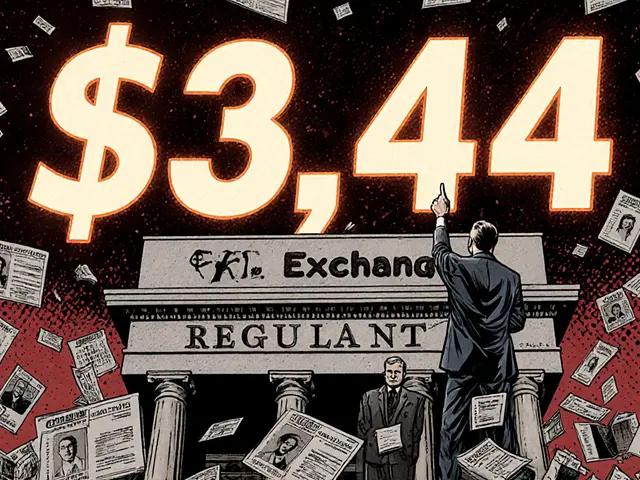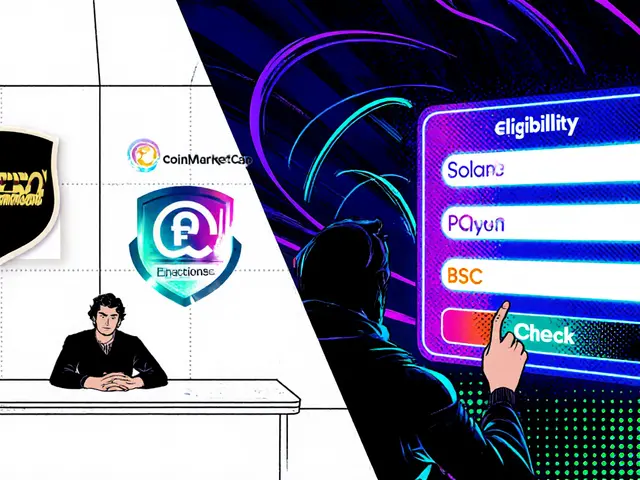
Crypto ETF Fee Calculator
Calculate Your Crypto ETF Fees
When you hear the term "ETF" you might think of a new kind of cryptocurrency token, but the reality is quite different. An crypto ETF is an exchange‑traded fund that gives investors exposure to digital assets without owning the coins themselves. This article clears up the confusion, explains how crypto ETFs work, and shows you how to decide whether they fit your portfolio.
Key Takeaways
- A crypto ETF is a regulated investment product, not a blockchain token.
- Spot ETFs hold the actual cryptocurrency; futures ETFs use contracts that track price movements.
- Major firms like BlackRock, Fidelity and Grayscale now offer spot Bitcoin and Ethereum ETFs.
- Fees typically range from 0.2% to 0.9% per year, plus standard brokerage commissions.
- Liquidity, tax treatment, and tracking error are the main considerations when choosing a crypto ETF.
What Is an ETF?
ETF stands for Exchange‑Traded Fund. It is a pooled investment vehicle that trades on traditional stock exchanges just like a stock. Traditional ETFs track stocks, bonds or commodities; a crypto ETF tracks one or more digital currencies. The fund issues shares that represent a proportional claim on the underlying assets, and those shares can be bought or sold throughout the trading day.
Why a Crypto ETF Is Not a Crypto Coin
Unlike Bitcoin or Ether, a crypto ETF is not minted on a blockchain, cannot be mined, and does not have a wallet address. It exists as a security regulated by the securities authority of the country where it is listed - in the United States, that authority is the SEC (Securities and Exchange Commission). Because it is a security, the ETF must follow disclosure rules, undergo periodic audits, and is protected (to a degree) by investor‑protection regulations.
How Crypto ETFs Work
When you buy shares of a crypto ETF, you are essentially buying a slice of a professionally managed basket that mirrors the price of a cryptocurrency. The fund manager either holds the actual coins (spot) or enters into futures contracts that settle based on the crypto’s price. The price of the ETF share fluctuates with the underlying asset, but it may diverge slightly due to fees, market demand, and tracking error.

Spot vs. Futures Crypto ETFs
| Feature | Spot ETF | Futures ETF |
|---|---|---|
| Underlying asset | Actual cryptocurrency held in custody | Futures contracts, no physical crypto |
| Price tracking | Usually tracks 1:1 (small tracking error) | Can deviate due to roll‑over costs |
| Regulatory risk | Higher - requires approval to hold real crypto | Lower - no need to store crypto |
| Typical fee range | 0.3% - 0.75% annually | 0.2% - 0.6% annually |
| Examples (2024) | BlackRock Bitcoin Spot ETF (BRRR), Fidelity Ethereum Spot ETF (FETF) | ProShares Bitcoin Strategy ETF (BITO), Valkyrie Bitcoin Futures ETF (BTF) |
The choice between spot and futures depends on your comfort with custodial risk, tax considerations, and how closely you want the ETF’s performance to mirror the crypto’s price.
Who Is Offering Crypto ETFs?
In 2024, the SEC approved several spot ETFs. The biggest names include:
- BlackRock - spot Bitcoin ETF
- Fidelity - spot Ethereum ETF
- Grayscale - both Bitcoin and Ethereum spot products
These firms bring the same research, custody, and compliance infrastructure that investors trust for traditional equity ETFs.
How to Invest in a Crypto ETF
- Open a brokerage account that offers access to U.S. or international exchanges (e.g., Charles Schwab, Fidelity, Interactive Brokers).
- Complete any KYC (Know‑Your‑Customer) forms required for securities trading.
- Fund the account via bank transfer or linked payment method.
- Search the ticker symbol (e.g., BRRR for BlackRock Bitcoin Spot).
- Review the fund’s prospectus - focus on fee structure, holdings, and tracking methodology.
- Place a market or limit order for the desired number of shares.
- Monitor the position, especially during high‑volatility crypto market swings.
Because ETFs trade like stocks, you can buy or sell any time the exchange is open, and you’ll see the trade reflected in your brokerage account almost instantly.
Advantages of Crypto ETFs
- Ease of access: No need to set up a digital wallet or manage private keys.
- Regulated environment provides investor protections and clear reporting.
- Liquidity - you can sell during market hours without waiting for a blockchain confirmation.
- Tax reporting is handled through standard brokerage statements, simplifying year‑end filing.

Limitations and Risks
- Volatility: Crypto markets can swing 10%+ in a single day, and the ETF will reflect that.
- Tracking error: Futures‑based products may diverge from the spot price.
- Management fees: While lower than many active funds, they still erode returns over long horizons.
- Regulatory risk: Future SEC rulings could affect product availability or taxation.
Fees, Taxes, and Performance
Management fees typically sit between 0.2% and 0.9% per year, charged automatically from the fund’s assets. Some brokers also levy a commission per trade, though many now offer commission‑free ETF trading. For tax purposes, the IRS treats most crypto ETFs as property, meaning capital gains are realized upon sale. However, because the ETF is a security, you receive a consolidated 1099‑B from your broker, which simplifies reporting compared to tracking dozens of individual crypto transactions.
Is a Crypto ETF Right for You?
If you already have a brokerage account, want exposure to Bitcoin or Ethereum, and dislike the technical hassle of wallets, a crypto ETF is a natural fit. If you prefer full control, want to hold altcoins not yet covered by ETFs, or are comfortable navigating decentralized exchanges, buying the coin directly on a platform like Kraken might make more sense.
Frequently Asked Questions
Can I trade a crypto ETF 24/7 like I do on a crypto exchange?
No. Crypto ETFs trade only during the hours of the stock exchange where they are listed. Most U.S. ETFs follow NYSE or Nasdaq hours, although extended pre‑market and after‑hours sessions are available for some brokers.
Do crypto ETFs hold the actual coins?
Spot ETFs do. They keep the underlying Bitcoin or Ethereum in cold storage custodians. Futures ETFs, on the other hand, hold contracts that settle based on price movements and never own the crypto itself.
What are the tax implications of a crypto ETF?
In the U.S., the IRS treats the ETF shares as property. When you sell, you incur capital gains or losses, reported on Schedule D. Because the broker provides a 1099‑B, you don’t need to track each transaction on the blockchain.
Are there crypto ETFs for altcoins like Solana or Cardano?
A few multi‑asset ETPs include exposure to those altcoins, but as of late 2025 pure‑coin ETFs for Solana, Cardano, or meme tokens have not received SEC approval. Expect more filings in the coming years.
How do fees of crypto ETFs compare to buying the coin directly?
Direct purchases avoid the annual expense ratio but you may incur higher custody fees on some platforms, plus you must manage wallets and security. Crypto ETFs bundle custody, compliance, and liquidity into a single (usually modest) fee.
Bottom line: a crypto ETF offers a regulated, convenient way to add Bitcoin or Ethereum exposure to a traditional portfolio. Understanding the mechanics, fees, and risks helps you decide whether it’s the right entry point or just a complement to direct crypto ownership.






There are 23 Comments
Jenna Em
Ever wonder why the money gurus push crypto ETFs like they're a secret weapon? It feels like they're trying to wrap the wild beast of Bitcoin into a neat, regulated package so they can keep a tight grip on the market. The SEC's blessing looks like a stamp of approval, but in reality it could be a leash. By trading an ETF you hand over control to big custodians while they collect fees on a daily basis. The illusion of convenience may hide the fact that the real power stays with the institutions.
Stephen Rees
One could argue that the very act of packaging crypto into a fund is a form of camouflage, allowing the overseers to monitor and influence price movements from behind the curtain. The veil of regulation might just be another layer of control, subtly guiding investor behavior without their awareness.
Katheline Coleman
Allow me to elucidate the fundamental distinction between a cryptocurrency and a crypto‑exchange‑traded fund. A cryptocurrency, such as Bitcoin or Ethereum, exists as a decentralized digital asset recorded on a blockchain, owned directly by the holder of its private keys. Conversely, a crypto‑ETF constitutes a pooled investment vehicle that issues tradable shares, the value of which mirrors the underlying digital asset or a basket thereof. The ETF shares are subject to the regulatory oversight of securities authorities, thereby affording investors the protections and reporting standards inherent to traditional securities. Nevertheless, the investor does not possess the underlying coins, nor the capacity to transfer them to a personal wallet. This structural nuance influences tax treatment, custody considerations, and, importantly, the degree of exposure to market volatility.
Amy Kember
Spot ETFs give you direct exposure futures just chase price
Evan Holmes
These articles sound impressive but at the end of the day it’s just another fee‑laden product.
Scott McCalman
Oh, come on! 🤩 The drama of “another fee” is exactly why people flock to the slick ETF world – it’s shiny, it’s easy, and the brokers love it! 😎
Andrew Smith
Listen up, folks – if you want real exposure without the hassle of wallets, jump on a spot Bitcoin ETF now, but keep an eye on those expense ratios!
mike ballard
Totally agree, the NAV drift and tracking error in a futures‑based ETP can really skew alpha, so stick to the spot ticker for clean beta exposure 🚀.
Molly van der Schee
I understand the hesitation; many newcomers feel overwhelmed by the technicalities, yet the regulated framework of an ETF can provide a reassuring bridge into the crypto arena.
Mike Cristobal
Honestly, avoiding the hassle of private keys is the responsible choice for most investors – why risk losing access when you can just buy a compliant share? 😊
Erik Shear
Crypto ETFs are just another way for Wall Street to profit from hype
Donnie Bolena
Wow, what a fantastic development, isn’t it?, the ability to trade Bitcoin on a traditional exchange, with the same ease as buying Apple stock, while enjoying the safety of regulated custody, and the transparency of daily pricing, truly a game‑changer!
Elizabeth Chatwood
i think its cool but u gotta watch those fees they can eat ur gains fast
Lindsey Bird
Oh my gosh, the sheer excitement of finally seeing a Bitcoin ETF on the ticker list is like watching fireworks explode across the night sky! It’s a moment that will go down in financial history!
john price
Listen, the market wll crush any idiot who dnt read the prospectus – fees, tracking error, custodial risk – all sum up to a lose if u don’t pay attention.
James Williams, III
Hey everyone, just a heads‑up: when you’re looking at a crypto ETF, check the expense ratio, the custodian reputation, and whether it holds the spot asset or just futures – those details can make a big difference.
Patrick Day
Don’t forget, the powers that be could pull the rug on ETF approvals tomorrow, leaving you stuck with a product they can twist any way they want.
PRIYA KUMARI
This so‑called “innovation” is just another corporate cash‑grab; the only people who benefit are the firms charging the fees while retail investors get the short end of the stick.
Jessica Pence
Quick tip: the 1099‑B you get from your broker will simplify tax reporting, but make sure you understand whether the ETF is classified as a capital asset or something else – it can affect your tax bracket.
johnny garcia
In summation, the prudent investor ought to conduct a thorough due‑diligence process, evaluating the expense ratio, liquidity, and custodial arrangements, prior to allocation; otherwise, one may inadvertently incur suboptimal returns. 🧐
Ryan Comers
While the mainstream hype glorifies these products, we must remember that true financial sovereignty lies in holding the actual coin, not a paper replica handed out by Wall Street elites. 🇺🇸💥
Prerna Sahrawat
It is an undeniable truth, steeped in the annals of financial evolution, that the emergence of crypto‑exchange‑traded funds represents a paradigmatic shift of Herculean proportions, one that beckons the discerning intellect to contemplate not merely the superficial allure of convenience but the profound ramifications enmeshed within the very fabric of market dynamics. The inaugural forays into regulated digital asset exposure were, at their inception, regarded with a mixture of scepticism and reverence, as if the financial establishment were attempting to domesticate a wild, untamable beast. Yet, as history has repeatedly illustrated, the act of domestication invariably introduces a new set of complexities, wherein the custodial responsibilities, custodial fees, and the spectre of tracking error coalesce into a tapestry of considerations that demand rigorous scholarly scrutiny. One must, therefore, interrogate the ontology of ownership that is ostensibly offered by a spot Bitcoin ETF, for while the share may mirror the price of the underlying asset, it does not confer the sacrosanct rights of private key custody, nor the philosophical autonomy that purists so ardently champion. Moreover, the regulatory apparatus that sanctions such instruments, though ostensibly protective, may engender a subtle form of paternalism that curtails the very spirit of decentralisation that underpins the crypto movement. Consequently, the investor is positioned at a crossroads, torn between the seductive promise of regulatory safety nets and the alluring yet perilous freedom of direct coin possession. In navigating this labyrinth, one must also contemplate the macro‑economic implications, such as the potential for amplified market liquidity, the attenuation of price volatility through institutional participation, and the concomitant risk of systemic contagion should regulatory edicts shift abruptly. The interplay of these variables is akin to a grand symphony, wherein each instrument-be it fee structure, tax treatment, or custodial security-must be harmonised to achieve a resonant, balanced outcome. Thus, the sagacious participant will eschew simplistic binaries, instead embracing a nuanced, multidimensional analysis that honours both the empirical data and the philosophical undercurrents that animate this nascent financial frontier. Ultimately, the decision to integrate a crypto ETF into one’s portfolio is not a mere transactional choice, but a reflective act that encapsulates one’s broader convictions regarding the future trajectory of monetary sovereignty.
Joy Garcia
Crypto ETFs are the polished façade of the crypto wilderness.
Write a comment
Your email address will not be published. Required fields are marked *